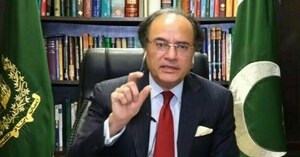Finance Minister Optimistic About Reversing US Tariffs
KARACHI: Finance Minister Muhammad Aurangzeb expressed optimism on Wednesday regarding the potential reversal of the 29 percent reciprocal tariff imposed by the United States. During a press briefing held at Federation House, the minister announced that Pakistan plans to dispatch a high-level delegation to the United States soon to engage in discussions about tariffs and various trade-related matters.
The minister underscored that the primary challenge in the trade relationship with the U.S. is not solely tariffs, but rather the existing trade imbalance.
“The current trade dynamics with the United States reveal that Pakistan’s exports amount to $5 billion, while imports stand at only $2.1 billion,” Aurangzeb explained. “The forthcoming delegation aims to rectify this imbalance by integrating sectors such as soybean, cotton, and others to foster a more equitable trade environment.”
The finance minister also conveyed positive expectations about electricity prices, pointing out that tariffs have already experienced a reduction, with additional decreases slated for announcement in July 2025.
No Tax Exemptions in the Upcoming Budget
Aurangzeb clarified that the forthcoming budget will eliminate exemptions for all sectors. “Every entity is obligated to contribute taxes,” he asserted. He noted that salaried individuals are currently responsible for 70% of income tax revenue, and guaranteed that the new budget would offer relief to this group.
The minister further mentioned that during his recent visit to the United States, he participated in over 70 significant meetings, including dialogues with the International Monetary Fund (IMF), World Bank, as well as representatives from China and Saudi Arabia. “All these institutions have acknowledged the macroeconomic improvements in Pakistan’s economy,” he stated.
Pakistan’s foreign exchange reserves have now reached $14 billion, and the current account is projected to remain in surplus.
The Monetary Policy Committee is scheduled to convene on May 5 to deliberate on further reductions in interest rates.
He added that the current 24th IMF program would be the final one for Pakistan.
Aurangzeb also emphasized the critical role of various sectors in the national economy, noting that while the textile industry remains paramount, IT, agriculture, pharmaceuticals, furniture, and the automotive sector are also significant contributors to exports.
“Pakistan’s IT exports are currently valued at $3.2 billion, with the potential to reach $8 billion in the coming years,” Aurangzeb stated.
He further mentioned ongoing discussions with the Exim Bank and other financial institutions regarding the Reko Diq mining project, which possesses an annual potential of $2.8 billion.
Furthermore, he noted ongoing efforts related to Web 3.0 and blockchain technology, including progress on the associated legal framework.
Commenting on the closure of the transit corridor to Central Asia for India, he said that conflict is not beneficial for any nation, and such actions would undoubtedly impact Indian transit trade.
Earlier, the FPCCI acting President Saqib Fayyaz inquired as to why interest rates were not being reduced further despite the positive economic indicators.
“Why aren’t interest rates decreasing at a faster pace? Is the current rate necessary to balance economic advancement and payments?”
Saqib highlighted the challenges encountered by exporters since their removal from the fixed tax regime in the previous budget.
“The export sector has experienced a negative impact due to the normal tax regime.
Additional taxes are decreasing tax collection rather than increasing it, and there are problems with fraudulent invoices,“ he stated.
The FPCCI leader commended the government and SIFC for their endeavors, noting that exports had increased by 7.7 percent to $24.6 billion in the first nine months of fiscal year 2025. However, he highlighted that the trade deficit had expanded by 4.5 percent.
“We acknowledge the contributions of overseas Pakistanis who have assisted in managing this deficit by sending $28 billion in remittances,” he stated, suggesting that “the upcoming budget should incorporate a special package for overseas Pakistanis.”
Meanwhile, Asif Sakhi, vice president urged the prime minister and chairman FBR to conduct forensic audit of the five-month progress of faceless assessment system (FAS). He suggested to carry out revenue evaluation of 50% percent green channel clearance under the FAS.



Comments (0)
No comments yet. Be the first to comment!
Leave a Comment